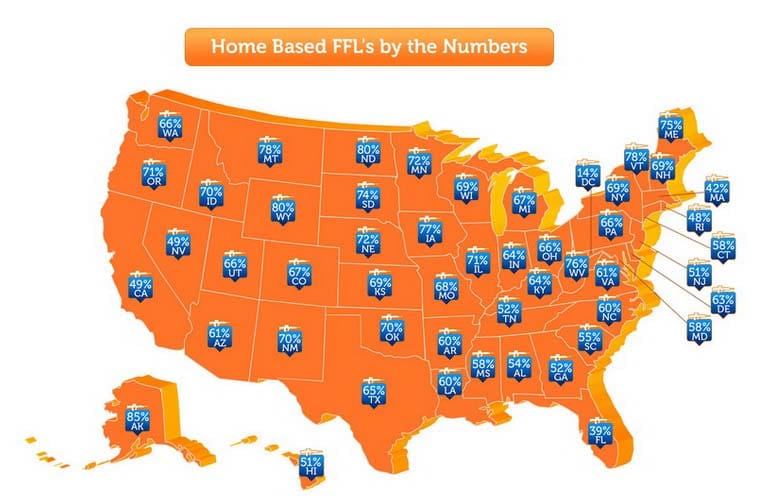How Much Does It Cost To Get A Ffl

By Brandon L. Maddox
Articles on the subject of getting your own Federal Firearms License have been generated a lot of discussion, but there seems to be a lot of confusion out there as to the process of becoming a license holder. So let's start with answering some of the FAQs.
Q: Can I get a FFL for only personal usage?
A: No, the Bureau of Alcohol, Tobacco, Firearms and Explosives (BATF or ATF) will not issue an FFL for 100% personal usage. Do you have to sell guns? No. Perhaps you have friends you can help with FFL transfers from GunBroker.com handgun purchases, for a small transfer fee? If so, your FFL wouldn't be 100% personal use . . .
Q: If I have an FFL, can the ATF show up day or night and harass me?
A: Per federal law, ATF can only inspect your firearms business location once every 12 months and can only do that during your hours of operation. ATF can only look at your ATF paperwork for record keeping. And they can only inspect FFL firearms inventory, not your personal firearms. Selecting appointment-only for hours of operation is possible in some situations, which would require a phone call before a compliance inspection.
Q: Do I need a storefront to get an FFL License?
A: Our research shows that more than 64% of all FFL locations are from home or residential addresses. United States federal law does not have conflicts with residential addresses. Massachusetts has a state law about residential addresses, but a work-around exists for online-only firearms dealers. Home is a viable option. (Check with local law enforcement.)
As a responsible person entering into a new adventure, it's always good to create a list of pros and cons:
PROS of getting a home-based FFL
- Low cost and overhead to start. No safe or alarm system is required.
- Access to manufacturer direct and wholesaler pricing on guns, ammo and other sporting goods; ordering online 24/7.
- Part-time, hobby income; money wife does not know about.
- You don't have to sell firearms. Many part-time niche adventures are possible, including gunsmithing, DuraCoating, internet transfers, hydro-graphics, Class 3 silencer sales, auction sales, internet sales, etc.
- Market demand from gun owners is at all-time record highs; Hillary in the background only helps.
- Help friends get good prices on hard-to-find firearms.
- No background checks or hassles to get firearms mailed to you directly.
- You can also work gun shows to gain exposure.
- All activities with this new gun shop adventure are often tax deductible; reduce your taxes.
- Often state gun-control laws do not apply to FFL holders. No waiting periods, no background checks; and you are often able to purchase items prohibited to non-FFLs.
CONS of getting a home-based FFL
- Security — You need to only invite those you know and trust.
- Paperwork needs to be kept for 20 years and kept well-organized.
- The license application fee is based on the type of license that you apply for. There are eight license types – Type 01 (The most common, for Dealers in Firearms Other than Destructive Devices), 02, 06, 07, 08, 09, 10, and 11. A Type 03 FFL, or Curio and Relics (C&R) license is a special license for the collector of curios. Unlike most FFLs, which are for dealers, gunsmiths, manufacturers and importers, the Type 03 FFL is intended to make gun collecting easy. There is a bit of confusion between a Class 03 FFL for Curio and Relics and a Class 03 Special Occupancy Tax (SOT) for manufacturers and dealers of NFA items. Often people are referring to the Type 03 SOT when they say Class 3 FFL. The Class 3 SOT is a special license and tax for businesses engaged in the manufacturing and/or dealing of NFA items like silencers, destructive devices, machine guns and short-barrel rifles or shotguns. The FFL application fees range from $30 to $200 and cover the first 3 years. Yes, the ATF will take a credit card on the application. The FFL renewal cost is $90 every three years afterward (which is only $30 per year).
- ATF does make FFL list public.
- To make largest profits, eventually you will need to focus on a niche market or grow the volume.
- Inventory can sometimes be hard to find quickly with demand being so high.
- Shipping to a home address can be tricky with a day job. ATF allows off-site storage and alternate mailing addresses, which helps.
- ATF can inspect your federal firearms licensee records every 12 months, only during your stated business hours. Industry average for a non-pawnbroker home-based FFL dealer is once every 30 years.
A large number of FFL holders initially started small, operating from home. And there are those predicting that the demand for firearms is head only one way — up. So your very own Federal Firearm License might be more than just a huge convenience. It can also be a good business opportunity.
Brandon Maddox is CEO of ffl123.com.
More information:
How to Get an FFL — A Brief Step-by-Step Guide
New Illinois Gun Dealer Licensing Act Drives Over 50% of FFLs Out-of-Business
ATF Website
Application Process
ATF Forms (including Fingerprint Cards)
ATF FAQs (including explanations of the Types of FFLs and answers for the manufacturer of firearms)
How Much Does It Cost To Get A Ffl
Source: https://www.thetruthaboutguns.com/getting-ffl-pros-cons/
Posted by: clarkducin1938.blogspot.com

0 Response to "How Much Does It Cost To Get A Ffl"
Post a Comment